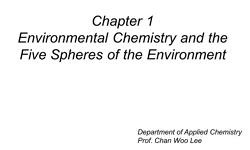Marine sediments (MSs) are one of the valuable natural resources for humans. By applying various remediation technologies, MSs which are classified as clean and natural or contaminated, including dredged materials, could be successfully transformed in...
http://chineseinput.net/에서 pinyin(병음)방식으로 중국어를 변환할 수 있습니다.
변환된 중국어를 복사하여 사용하시면 됩니다.
- 中文 을 입력하시려면 zhongwen을 입력하시고 space를누르시면됩니다.
- 北京 을 입력하시려면 beijing을 입력하시고 space를 누르시면 됩니다.
A Case-study; How to Achieve Sustainable Beneficial Uses of Marine Sediments in Colombia = 사례 연구; 콜롬비아 해양 퇴적물의 지속 가능한 유익한 사용을 달성하는 방법
한글로보기https://www.riss.kr/link?id=T16851562
- 저자
-
발행사항
대전 : Korea Institute of Ocean Science and Technology (KIOST), 2023
- 학위논문사항
-
발행연도
2023
-
작성언어
영어
- 주제어
-
발행국(도시)
대전
-
형태사항
85 ; 26 cm
-
일반주기명
지도교수: Prof. Dr. Kyoungrean Kim
-
UCI식별코드
I804:30003-200000688553
- 소장기관
-
0
상세조회 -
0
다운로드
부가정보
다국어 초록 (Multilingual Abstract)
After evaluating the qualities of marine sediment in Colombia, concentrations of specific harmful heavy metals (HHMs) such as mercury (Hg), zinc (Zn), lead (Pb), and copper (Cu) were found to exceed the environmental standards of various nations expecting adverse effects on water bodies and marine life. Ex-situ technologies were evaluated from cost–benefit analysis and environmental feasibility. Based in the results, the proposed methodology appeared suitable to select remediation technologies. This research identified solidification/stabilization (S/S) as the most suitable technologies for sustainable sediment remediation in Colombia. Sustainable beneficial uses of MSs may offer ample opportunities for environmental enhancement and economic benefits from the point of view of new circular economies. Continuous research and adopting appropriate environmental regulations, such as the London Protocol, 1996 (LP), would contribute to effectively managing all MSs. More innovative and cost-effective technologies to obtain beneficial uses of MSs would still be needed to mitigate global environmental issues such as marine pollution by contaminated sediments. Decision makers may use the environmental assessment tools developed to select optimal remediation technologies and implement sustainable management of MSs by achieving their beneficial uses.
Marine sediments (MSs) are one of the valuable natural resources for humans. By applying various remediation technologies, MSs which are classified as clean and natural or contaminated, including dredged materials, could be successfully transformed into commercially useful products. However, the selection of remediation technologies may still be challenging for decision-makers. This research aims to develop a comprehensive environmental assessment to identify promising ex-situ technologies for MSs in Colombia, and propose management frameworks to achieve sustainable beneficial uses. A novel approach has been proposed to recognize all MSs as potentially exploitable resources in the context of sustainable development. Through various case studies, this research allows the understanding of the mechanisms involved in sediment remediation and promotes the development of new remediation technologies. Further studies have not been reported on this issue in Latin America, including Colombia until now.
After evaluating the qualities of marine sediment in Colombia, concentrations of specific harmful heavy metals (HHMs) such as mercury (Hg), zinc (Zn), lead (Pb), and copper (Cu) were found to exceed the environmental standards of various nations expecting adverse effects on water bodies and marine life. Ex-situ technologies were evaluated from cost–benefit analysis and environmental feasibility. Based in the results, the proposed methodology appeared suitable to select remediation technologies. This research identified solidification/stabilization (S/S) as the most suitable technologies for sustainable sediment remediation in Colombia. Sustainable beneficial uses of MSs may offer ample opportunities for environmental enhancement and economic benefits from the point of view of new circular economies. Continuous research and adopting appropriate environmental regulations, such as the London Protocol, 1996 (LP), would contribute to effectively managing all MSs. More innovative and cost-effective technologies to obtain beneficial uses of MSs would still be needed to mitigate global environmental issues such as marine pollution by contaminated sediments. Decision makers may use the environmental assessment tools developed to select optimal remediation technologies and implement sustainable management of MSs by achieving their beneficial uses.
목차 (Table of Contents)
- 1. Introduction 3
- 1.1 Marine Sediments 4
- 1.1.1 Classification of Marine Sediments 4
- 1.2 Contaminated Marine Sediments 5
- 1. Introduction 3
- 1.1 Marine Sediments 4
- 1.1.1 Classification of Marine Sediments 4
- 1.2 Contaminated Marine Sediments 5
- 1.3 Pollution Sources of Marine Sediments 5
- 2. Materials and Methods 7
- 2.1 Scope of this Thesis 7
- 2.2 Site Characterization 9
- 2.3 Methodology 11
- Chapter I: Sediment Quality Assessment 11
- 2.3.1 Marine Sediment Qualities of the Colombian Caribbean 11
- 3. Results 13
- Chapter II: Evaluation of Remediation Technologies 13
- 3.1 Ex-situ-situ Remediation Technologies 13
- 3.1.1 Physical Technologies 15
- 3.1.1.1 Physical Separation 15
- 3.1.2 Chemical (including Thermal) Technologies 15
- 3.1.2.1 Sediment Extraction 15
- 3.1.2.2 Vitrification 16
- 3.1.2.3 Electrokinetic 17
- 3.1.2.4 Volatilization 18
- 3.1.3 Biological Technologies 18
- 3.1.3.1 Phytoremediation 18
- 3.1.4 Complex Technologies 19
- 3.1.4.1 Solidification/stabilization 19
- 4. Discussion 24
- 4.1 Considering Optimal Conditions for a Suitable Sediment Remediation 24
- 4.2 Environmental Risk Assessment 26
- 4.3 Proposed Methodology for Selecting Remediation Technologies 27
- 4.4 Comparisons of Technologies for Sediment Remediation 33
- 4.5 Sustainable Management of Marine Sediments 36
- 4.5.1 Beneficial Uses of Marine Sediments 36
- 4.6 International and Colombian Regulatory Conventions for Managing Marine Sediments 36
- 4.6.1 The London Protocol, 1996 (LP) 36
- 4.6.2 The Convention for Prevention of Marine Pollution (MARPOL) 37
- 4.6.3 Marine Environmental Conventions in Colombia 38
- Chapter III: Proposed Frameworks for Colombia
- 4.7 Management Frameworks for Sustainable Beneficial Uses of Marine Sediments 41
- 5. Conclusions 44
- 5.1 Reflection of Limitations 44
- 5.2 Applicability and Research Needs 45
- Bibliography 47
- Acknowledgments 51
- Appendixes 53










